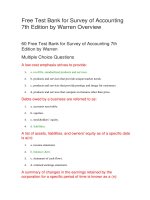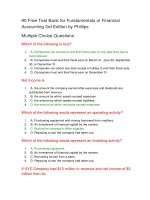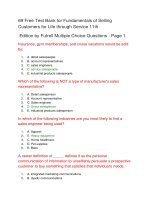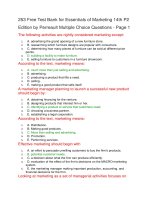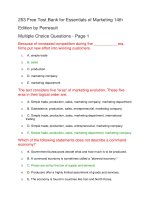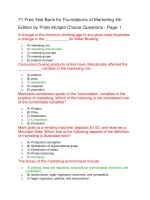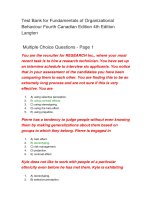100 free test bank for fundamentals of selling 13th edition đề trắc nghiệm marketing
Bạn đang xem bản rút gọn của tài liệu. Xem và tải ngay bản đầy đủ của tài liệu tại đây (118.73 KB, 20 trang )
Free Test Bank for Fundamentals of Selling 13th
Edition
Mutiple Choice Questions
People like to buy from people they know and trust, which
illustrates the importance of using:
1.
2.
3.
4.
5.
A. the Golden Rule of Selling.
B. traditional methods of selling.
C. a transactional approach to sales.
D. the trial close ahead of close.
E. an alternative sales close.
The person behind the counter at McDonald's who enters
your order, takes your money, and hands you your
food is a(n):
1.
2.
3.
4.
5.
A. retail salesperson.
B. sales executive.
C. order-getter.
D. direct salesperson.
E. account representative.
Billy Marshall sells blank aluminum cans for soda
manufacturers to fill. Billy would be best classified as
a(n):
1.
2.
3.
4.
5.
A. detail salesperson.
B. account representative.
C. sales engineer.
D. direct salesperson.
E. industrial products salesperson.
Peter sells electrical supplies to retailers and home builders.
Peter's organization buys the electrical supplies from
various manufacturers. Peter is best classified as a(n)
_________.
1.
2.
3.
4.
5.
A. retail salesperson
B. detail salesperson
C. accounts representative
D. wholesale salesperson
E. sales engineer
According to the text, which of the following is an example of
a technical skill?
1.
2.
3.
4.
5.
A. Mastering presentation techniques
B. Solving problems strategically
C. Building customer relationships
D. Setting long-term goals
E. Working with others
In the position of an account representative, an employee is
most likely to:
1.
2.
3.
4.
5.
A. concentrate on performing promotional activities and introducing new products.
B. sell products that call for an ability to discuss technical aspects of the product.
C. sell tangible, highly complex products to industrial buyers and manufacturers.
D. call on a large number of already established customers and ask for orders.
E. sell the benefits of intangible or nonphysical products such as financial
services.
What is one of the reasons that people choose sales jobs?
1.
2.
3.
4.
5.
A. Very little pressure
B. High degree of freedom
C. Minimal accountability required
D. Few skills needed for success in the field
E. High fixed salaries compared to most other jobs.
In which of the following situations is the individual NOT
actively engaged in selling?
1.
2.
3.
A. Steve is trying to convince his professor that he deserves an "A."
B. Brendan is persuading Marilyn to loan him $10, so he can order a pizza.
C. Chad is trying to convince his biology lab partner to sketch the internal organs
of the frog they dissected in lab.
4. D. Anna is trying to persuade her husband to attend her family reunion.
5. E. Daniel is creating a logo for his home-based Web services company.
The acronym SSUCCESS is used in selling to help you
remember the eight:
1.
2.
3.
4.
5.
A. most frequently listed characteristics needed to be successful in sales.
B. steps required to create a customer profile.
C. mental stages of the customer purchasing process.
D. types of knowledge a salesperson needs to succeed.
E. steps to creating an effective sales presentation.
Which of the following statements about sales jobs is most
likely false?
1.
A. Sales jobs require salespeople to exhibit more tact than other professions do.
2.
3.
B. Many salespeople work with little or no supervision.
C. Many sales jobs require considerable traveling and time spent away from
family.
4. D. Salespeople represent their companies to the outside world.
5. E. Salespeople spend little or no company funds for entertainment.
Unlike the traditional definition of personal selling, the new
definition:
1.
2.
3.
4.
5.
A. relates personal selling more closely to transactional marketing.
B. identifies electronic selling as the most effective channel.
C. stresses the importance of being unselfish in selling.
D. excludes telemarketing activities due to ethical concerns.
E. substitutes the word "relationship marketing" for "personal selling."
Anderson is a used cars salesperson, and he believes in the
Golden Rule of Personal Selling. He would most likely
believe that:
1.
2.
3.
4.
5.
A. profit maximization is the ultimate goal of business.
B. an action is acceptable if it is legally correct.
C. salespeople should be driven by pride and achievements.
D. money and long-term customer loyalty are essential.
E. positive sales results are to be attributed to other people.
Which of the following is NOT part of the acronym
SSUCCESS?
1.
2.
3.
4.
5.
A. Use of the Golden Rule
B. Stamina for the job
C. Personal characteristics
D. Strategic thinking
E. Cultural sensitivity
In addition to performance, the salary earned by a sales
manager is LEAST related to the:
1.
2.
3.
4.
5.
A. annual sales volume of units managed.
B. number of salespeople managed.
C. length of experience in sales.
D. annual sales volume of the firm.
E. educational qualifications.
_____ is traditionally defined as the personal communication
of information to persuade a prospective customer to
buy something which satisfies that individual's needs.
1.
2.
3.
A. Marketing
B. Personal selling
C. Public relations
4.
5.
D. Advertising
E. Promotion
The _____ refers to the sales philosophy of unselfishly
treating others as you would like to be treated.
1.
2.
3.
4.
5.
A. Equity Sales Theory
B. Reciprocity Principle
C. 80/20 Principle of Sales
D. ABCS Rule of Salesmanship
E. Golden Rule of Personal Selling
Which term refers to the salesperson's sequential series of
actions that lead toward the customer taking a desired
action?
1.
2.
3.
4.
5.
A. Talent management
B. Marketing mix
C. Sales process
D. Sales presentation
E. Marketing process
A(n) _____ focuses on performing promotional activities and
introducing new products rather than directly
soliciting orders.
1.
2.
3.
4.
5.
A. sales engineer
B. account representative
C. detail salesperson
D. retail salesperson
E. service salesperson
Which of the following statements about sales success is
most likely true?
1.
2.
A. For success in sales, it is more important to speak well than to listen well.
B. Modern salespeople make contributions to the welfare of others through
service.
3. C. Operational orientation is more important to salespeople than strategic
orientation.
4. D. Successful salespeople are more focused on closing than the other aspects of
sales.
5. E. Physical attributes such as stamina are not relevant to long-term sales success.
Surveys have found that salespeople are rated low on ethics
and honesty. What is the most likely reason for such
results?
1.
2.
A. People believe products are overpriced.
B. People lack trust and confidence in sales personnel.
3.
4.
5.
C. People perceive that salespeople sell low quality goods.
D. Salespeople are unable to encourage impulsive buying during sales calls.
E. Most firms lack sales forces that have adequately qualified and trained
personnel.
Laura sells drawer pulls, hinges, and other decorative metal
pieces used in the manufacture of furniture. Since the
products that she sells to the furniture makers are
nontechnical in nature, Laura could be best described
as a(n):
1.
2.
3.
4.
5.
A. account representative.
B. detail salesperson.
C. sales engineer.
D. order-taker.
E. industrial products salesperson.
Effective territory management most likely requires
salespeople to:
1.
2.
3.
4.
5.
A. engage in strategic management opportunities.
B. build integrated marketing communications systems.
C. avoid nonselling activities due to cost overruns.
D. provide employers with market information.
E. sell exclusively to overseas, corporate clients.
_____ is the final step in the selling process.
1.
2.
3.
4.
5.
A. Presentation
B. Meeting objections
C. Sale closing
D. Follow-up and service
E. Sales delivery
Robert Clarence is a(n) _____ for a manufacturer of
restaurant-grade appliances. He does not directly
solicit orders. His primary duties involve promotional
activities such as introducing and demonstrating new
products at trade shows.
1.
2.
3.
4.
5.
A. retail salesperson
B. detail salesperson
C. sales engineer
D. service salesperson
E. account representative
Which of the following positions appears lower than other
positions in the upward sequence of job movements
during a sales career?
1.
2.
3.
4.
5.
A. District sales manager
B. Key account salesperson
C. Regional sales manager
D. Area sales manager
E. Divisional sales supervisor
A sales engineer:
1.
2.
3.
4.
5.
A. services the retail products sold to customers.
B. services the industrial products sold to institutions.
C. sells products directly to consumers.
D. is also known as an order-taker.
E. sells products that call for technical know-how.
According to Megatrends 2010 by Patricia Aburdene, the
greatest megatrend in the U.S. is:
1.
2.
3.
4.
5.
A. business communication.
B. excessive consumerism.
C. global environmentalism.
D. spirituality in business.
E. personal growth.
The person who telephoned James last night to ask him if he
was interested in adding HBO and Cinemax to his
current television cable system would be classified as
a(n):
1.
2.
3.
4.
5.
A. relationship seller.
B. retail salesperson.
C. order-taker.
D. account representative.
E. sales engineer.
According to the text, what is the most difficult trait for a
salesperson to develop?
1.
2.
3.
4.
5.
A. Kindness
B. Self-control
C. Patience
D. Caution
E. Fairness
Which of the following is most likely a characteristic of
traditional salespeople?
1.
2.
3.
4.
5.
A. Building long-term relationships with customers
B. Making legal and ethical decisions
C. Focusing exclusively on customer service
D. Finding others’ interests more important than their own
E. Seeking recognition for their efforts
Which of the following is identified by the text as a
conceptual skill?
1.
2.
3.
4.
5.
A. Using technology
B. Thinking strategically
C. Using persuasive speech
D. Mastering sales techniques
E. Working with other people
According to the text, there are several questions you should
ask yourself as you decide whether a career in sales is
appropriate for you. Which one of the following is
LEAST relevant to determining whether a career in
sales is best for you?
1.
2.
3.
4.
5.
A. How much freedom do I want in a job?
B. Do I have the personality characteristics for the job?
C. Am I willing to transfer to another city?
D. Do I mind traveling for work?
E. How much money do I want to earn?
_____ skills refer to the seller's understanding and
proficiency in the performance of specific tasks.
1.
2.
3.
4.
5.
A. Conceptual
B. Operational
C. Automated
D. Transactional
E. Technical
The "heart" of the eight work characteristics for sales
success is:
1.
2.
3.
4.
5.
A. sales knowledge.
B. cultural sensitivity.
C. love of selling.
D. communication ability.
E. stamina for the job.
Donna Carter goes from house-to-house in her
neighborhood taking orders for Pampered Chef
kitchen products. Donna’s face-to-face sales with
consumers are an example of:
1.
2.
3.
4.
5.
A. direct selling.
B. wholesale selling.
C. account representation.
D. detail selling.
E. sales engineering.
Dwight has recently been promoted to a position as a
territory manager. Which of the following should
Dwight expect to do in his new job?
1.
2.
3.
4.
5.
A. Recruiting new employees
B. Developing ad campaigns
C. Designing product logos
D. Solving customer issues
E. Calculating overhead costs
A salesperson that adheres to the Golden Rule of Personal
Selling:
1.
2.
3.
4.
5.
A. is primarily motivated by money.
B. is driven by pride and recognition.
C. focuses on laws rather than morals.
D. finds others' interests most important.
E. requires intensive monitoring from managers.
As a part of providing service to customers, a professional
salesperson would be expected to do all of the
following EXCEPT:
1.
2.
3.
4.
5.
A. return damaged merchandise.
B. handle customer complaints.
C. develop promotional ideas.
D. suggest business opportunities.
E. provide information to competitors.
Which of the following statements about small businesses is
false?
1.
2.
3.
4.
5.
A. Almost half of all U.S. firms are small businesses.
B. Small firms are a vital component of the U.S. economy.
C. Small businesses can be both incorporated and unincorporated.
D. Most large firms began as small businesses.
E. Many small businesses struggle to compete with large firms.
All of the following are benefits of e-selling for salespeople
EXCEPT:
1.
2.
3.
4.
5.
A. developing rapport with new customers.
B. increasing the speed for qualifying leads.
C. reducing paperwork.
D. reporting new sales to the company.
E. servicing customers after the sale.
Which of the following is the logical order of salespeople
from high to low levels of self-interest?
1.
2.
3.
4.
5.
A. Golden Rule, traditional, professional
B. traditional, Golden Rule, professional
C. professional, traditional, Golden Rule
D. Golden Rule, professional, traditional
E. traditional, professional, Golden Rule
Which of the following is NOT one of the four main elements
in the customer relationship process used by
salespeople to build long-term relationships?
1.
2.
3.
4.
5.
A. Providing service
B. Analyzing needs
C. Gaining commitment
D. Evaluating competitors
E. Presenting product benefits
Fred has decided to switch from cable to satellite television.
Fred calls DirecTV and speaks with an individual
named Susan who places the order and collects Fred’s
payment information. Susan is most likely a(n):
1.
2.
3.
4.
5.
A. detail salesperson
B. order-taker
C. service salesperson
D. wholesale salesperson
E. order-getter
The Golden Rule of Personal Selling refers to the sales
philosophy of:
1.
2.
3.
4.
5.
A. unselfishly treating others as you would like to be treated.
B. giving more importance to sales maximization than profit maximization.
C. making sales mutually beneficial to the buyer and seller.
D. obtaining a financial benefit by helping others.
E. realizing a major part of the profit from only a few customers.
Kevin contacted his local phone company yesterday and
talked to the receptionist about whether or not it is
possible to have an Internet connection without having
local phone service. The receptionist is likely to have
put him in touch with a(n):
1.
2.
3.
4.
5.
A. detail salesperson.
B. retail salesperson.
C. order-taker.
D. account representative.
E. sales engineer.
Since it is essential to build a long-term relationship with
buyers, the salesperson's job is to:
1.
2.
A. persuade the customer to perform the desired action without much delay.
B. coerce the customer to make a decision in favor of the company as early as
possible.
3. C. present necessary information for the buyer to make an educated decision.
4. D. influence the customer-decision making process by manipulating available
information.
5. E. make sales presentations that are favorable to the company and its products.
A senior salesperson regularly contacts the larger, more
important customers. This function is referred to as
a(n) _____ sales position.
1.
2.
3.
4.
5.
A. technical
B. imagery
C. key account
D. composite
E. alternate
The basic competencies of selling that are required of top
professional salespeople are selling skills and
_________.
1.
2.
3.
4.
5.
A. accounting knowledge
B. product knowledge
C. ethical social responsibility
D. interpersonal communication
E. computer expertise
Which of the following statements about order-getters is
most likely true?
1.
2.
A. They do not use a sales strategy.
B. They wait for customers to place orders.
3.
4.
5.
C. They avoid creative sales presentations.
D. They often do not attempt to close a sale.
E. They typically earn more money than order-takers.
All of the following are nonfinancial rewards salespeople
experience EXCEPT:
1.
2.
3.
4.
5.
A. job knowledge.
B. job satisfaction.
C. club memberships.
D. positive self-worth.
E. customer appreciation.
(p. 12) In which of the following industries are you most
likely to find a sales engineer being used?
1.
2.
3.
4.
5.
A. Apparel
B. Heavy equipment
C. Pharmaceuticals
D. Pet supplies
E. Health food
Sean is a salesperson with exceptional cognitive and
technical skills and limited human skills. As a result,
he most likely excels in all of the following areas
EXCEPT:
1.
2.
3.
4.
5.
A. creating organized sales presentations.
B. solving product problems and issues.
C. knowing how a product fits into a customer's business.
D. using creative techniques for selling products.
E. working patiently with customers.
_____ skill is the cognitive ability to see the selling process
as a whole and the relationship among its parts.
1.
2.
3.
4.
5.
A. Human
B. Observational
C. Conceptual
D. Technical
E. Developmental
In a large firm like Hewlett-Packard or General Electric, a
salesperson's career path usually begins at the level
of:
1.
2.
3.
A. district sales manager.
B. sales engineer.
C. sales trainee.
4.
5.
D. key account salesperson.
E. assistant manager.
Arthur, a pharmaceutical sales representative, is liked by his
clients and he likes them. He is never critical and
unsympathetic of his customers. Arthur most likely
has _____ skills.
1.
2.
3.
4.
5.
A. networking
B. operational
C. technical
D. human
E. conceptual
True - False Questions
A customer contact person performs the same tasks as a
salesperson.
1.
2.
True
False
A wholesale salesperson would sell athletic shoes to a
sporting goods store which in turn would resell the
shoes to individual customers.
1.
2.
True
False
A divisional sales manager has a higher ranking in most
firms than a regional sales manager.
1.
2.
True
False
As a salesperson’s self-interest decreases, a salesperson’s
interest in providing customer service is more likely to
increase.
1.
2.
True
False
Salespeople do not need increase sales in old accounts if
they are generating a sufficient quantity of new
customers.
1.
2.
True
False
Order-getters ask what the customers want or wait for
customers to place an order.
1.
2.
True
False
The sales process refers to the checklist salespeople use to
prepare for addressing prospects' objections.
1.
2.
True
False
An employee at a fast-food restaurant who asks the manager
for a raise is engaged in the selling process.
1.
2.
True
False
Acts such as building rapport, uncovering needs, and
designing sales presentation strategies are collectively
referred to as prospecting.
1.
2.
True
False
Direct sellers sell face-to-face to consumers who use the
products for their personal use.
1.
2.
True
False
An outside salesperson operates with less direct supervision
compared to other employees in an organization.
1.
2.
True
False
According to the typical sales personnel career path, the first
managerial level job that a salesperson can expect to
earn is that of regional sales manager.
1.
2.
True
False
The acronym ABCS represents the tools needed for creating
a successful marketing mix.
1.
2.
True
False
Given that sales jobs offer higher nonfinancial rewards than
most other areas of corporate America, the
compensation of salespeople is typically lower than
that of workers in areas like production who are at a
comparable level in the organization.
1.
2.
True
False
According to recent Gallup surveys, most Americans believe
that traditional salespeople are overly interested in the
needs of customers.
1.
2.
True
False
A retail salesperson sells goods or services to consumers
for personal and business use.
1.
2.
True
False
The role of a service salesperson is selling the benefits of
intangible products such as financial services.
1.
2.
True
False
In order to build long-term relationships with customers,
salespeople need to present adequate information to
buyers and apply enough pressure to ensure quick
sales.
1.
2.
True
False
Self-control refers to a salesperson's intelligence, product
knowledge, and discipline rather than to emotions,
passions, and desires.
1.
2.
True
False
Unlike traditional and Golden Rule salespeople, professional
salespeople have a tendency to attribute sales
success to others rather than to their own actions.
1.
2.
True
False
The Golden Rule of Personal Selling describes the
willingness to plan and execute product, price,
distribution, and promotion plans so as to create
exchanges that satisfy individual and organizational
objectives.
1.
2.
True
False
Top salespeople speak the other person's language, both in
verbal and nonverbal communication.
1.
2.
True
False
Jobs such as inside retail sales and outside delivery are
typically performed by order-getters.
1.
2.
True
False
Golden Rule salespeople tend to believe that money is to be
shared and that customer service is a top priority.
1.
2.
True
False
A detail salesperson concentrates on directly soliciting
orders.
1.
2.
True
False
Salespeople should avoid providing information to their
companies or customers about competitors' activities
or market opportunities since such actions violate
client confidence and are considered unethical.
1.
2.
True
False
Financial rewards for professional salespeople are
commonly solely based on performance.
1.
2.
True
False
Emotional self-control is difficult for many salespeople to
develop because of personal and financial investments
in making sales to customers.
1.
2.
True
False
Personal selling refers to the personal communication of
information to unselfishly persuade a prospective
customer to buy something that satisfies that
individual's needs.
1.
2.
True
False
The final step in the selling process is customer follow-up.
1.
2.
True
False
E-selling is limited to sales made through the use of Web
sites.
1.
2.
True
False
Nonfinancial rewards given by the company are referred to
as commissions.
1.
2.
True
False
Conceptual skills are especially important for the creative
order-getters.
1.
2.
True
False
Selling and marketing are interchangeable terms for the
same business activity.
1.
2.
True
False
A salesperson’s conceptual skills allow the salesperson to
see the selling process as a whole and the relationship
among its parts.
1.
2.
True
False
Free Text Questions
What are the differences between order-takers and ordergetters? Which job do you think would be more
rewarding or difficult? Why?
Answer Given
Some sales jobs require the salesperson only to take orders. Order-takers do not
have a sales strategy and often use no sales presentation. Many never attempt to
close a sale, and more importantly, few actually create sales. They may ask what
the customer wants or wait for the customer to order. They are employed to bring
in additional business that the employer probably would not obtain without their
efforts. Order-getters, on the other hand, get new and repeat business using a
creative sales strategy and a well-executed sales presentation. They creatively
sell tangible goods or intangible services in highly competitive industries where the
merchandise cannot be sold in equal volume without a salesperson. They face
infinitely more difficult selling situations than the order-takers. Order-getters are
true salespeople, which is why order-getters earn so much more than ordertakers.
What are the six major reasons for choosing a sales career?
Why would you consider a career in sales?
Answer Given
The six major reasons for choosing a sales career are:• The wide variety of sales
jobs available; • The freedom of being on your own; • The challenge of selling; •
The opportunity for advancement in a company; • The rewards from a sales
career; • The opportunity to provide service to others.
Briefly describe the main types of manufacturer sales
positions.
Answer Given
There are five main types of manufacturer sales positions:• An account
representative calls on a large number of already established customers. This
person asks for the order; • A detail salesperson concentrates on performing
promotional activities and introducing new products rather than directly soliciting
orders; • A sales engineer sells products that call for technical know-how and an
ability to discuss technical aspects of the product. Expertise in identifying,
analyzing and solving customer's problems is another critical factor; • An industrial
products salesperson, nontechnical, sells a tangible product to industrial buyers.
No high degree of technical knowledge is required; • A service salesperson, unlike
the four preceding types of manufacturing salespeople, must sell the benefits of
intangible products such as financial, advertising, or computer repair services.
What are the two types of rewards that salespeople can
earn? Give an example of each.
Answer Given
The two types of rewards that salespeople can earn are financial and nonfinancial.
Nonfinancial rewards are sometimes called psychological income or intrinsic
rewards. They are generated by the individual and not given by the company. An
example of a nonfinancial reward is a feeling of self-worth. Many are attracted to
selling because in a sales career financial rewards are commonly based solely on
performance. Salaries and sales commissions are examples of financial rewards.
What are the four main elements in the customer relationship
process? What is the purpose of building customer
relationships?
Answer Given
The four main elements in the customer relationship process used by salespeople
to build long-term relationships are: • Analyze customer needs; • Present product
benefits; • Gain commitment for the purchase; • Provide excellent service in order
to maintain and grow the relationship.
How do sales jobs differ from other jobs? What aspects
would you enjoy or dislike? Why?
Answer Given
Sales jobs are different from other jobs in several ways. Salespeople represent
their companies to the outside world. Consequently, opinions of a company and its
products are often formed from impressions left by the sales force. Other
employees usually work under close supervisory control, whereas the outside
salesperson typically operates with little or no direct supervision. Salespeople
probably need more tact, diplomacy, and social poise than other employees in an
organization. Salespeople are among the few employees authorized to spend
company funds. Some sales jobs frequently require considerable traveling and
time spent away from home and family.
What is the traditional definition for personal selling? How
does the traditional definition differ from the new one
in the text?
Answer Given
The new definition of personal selling inserts the word "unselfish" into the
traditional definition. According to the new definition, personal selling refers to the
personal communication of information to unselfishly persuade a prospective
customer to buy something - a good, a service, an idea or something else - that
satisfies that individual's needs.
List and briefly explain three important categories of skills
that are necessary for a salesperson's success.
Answer Given
The necessary skills that are necessary for a salesperson's success can be
summarized in three categories that are especially important: conceptual, human,
and technical. Conceptual skill: It is the cognitive ability to see the selling process
as a whole and the relationship among its parts. It involves the seller's thinking
and planning abilities. This skill is especially important for order-getters. Human
skill: It is the seller's ability to work with and through other people. Salespeople
demonstrate this skill in the way they relate to other people. A seller with human
skills likes other people and is liked by others. Technical skill: It is the
understanding and proficiency in the performance of specific tasks. It includes
mastery of the methods, techniques, and equipment involved in selling such as
presentation skills and uses for one's products. It includes specialized knowledge,
analytical ability, and the competent use of tools and techniques to solve problems
in that specific domain.
What does the acronym SSUCCESS signify? Explain briefly.
Answer Given
The acronym SSUCCESS signifies the eight most frequently mentioned
characteristics necessary to be successful in sales. It refers to: • Service to others;
• Use of the Golden Rule; • Communication ability; • Personal characteristics; •
Excellence at strategic thinking; • Sales knowledge; • Stamina for the job; • Love of
selling at the heart of all the above.
How do salespeople impact society?
Answer Given
Salespeople generate more revenue in the U.S. economy than workers in any
other profession. Salespeople impact society in such diverse areas as: • The
success of new products; • Keeping existing products on the retailer's shelf; •
Constructing manufacturing facilities; • Opening businesses and keeping them
open; • Generating sales orders that result in the loading of trucks, trains, and
other means of transport that carry goods to customers all over the world.
